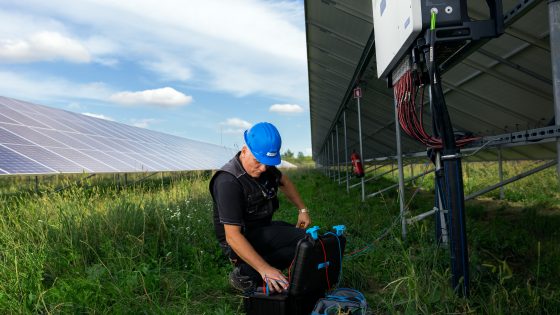Davos: Modern challenges require the cooperation of everyone, not just governments

Minister for Digital Transformation Dr. Emilija Stojmenova Duh presented the directions of Slovenia in the adoption of legislation and the search for synergies with the economy.
Partnerships and collaboration in the digital society
According to her, the challenges of our time are so demanding that they cannot be answered only by governments or state institutions themselves, but require the cooperation of all actors in society. Through regulatory measures and investments in innovation and human resources, governments can encourage companies to achieve sustainable progress for all and to find effective solutions for the benefit of society as a whole, as well as in the synergies of strategic partnerships between the public and private sectors.
Therefore, when regulating the use of artificial intelligence, Slovenia strives for an understandable, clear and stable and especially predictable and therefore easier to implement regulation, where companies will easily recognize opportunities and obligations and will be able to follow the rapid development of digital technologies. She particularly drew attention to investments in educational programs and training, where employees can be equipped with the skills that are absolutely necessary in the digital age.
In terms of necessary cooperation, the World Economic Forum also provides a unique platform not only for sharing best practices between countries, but also for bringing together private companies and civil society to make joint commitments to adopt technologies that serve humanity.
The importance of trust and inclusion
According to Minister Stojmenova Duh, the government can encourage investments in infrastructure with various measures, such as incentive programs, tax reliefs, grants, public-private partnerships, digital assistance to rural areas, increasing digital literacy among vulnerable population groups, and global integration in development artificial intelligence. However, a true digital transformation always begins with the trust of citizens and companies in modern technologies, because, according to the minister, trained and motivated citizens are the key to better and innovative solutions, and the digital transition is successful when all residents are equally involved and no one is neglected .
The recording of the panel is available in its entirety on the website of the World Economic Forum.
Jobs of the future
The meeting in Davos began on Monday, January 15, and the minister joined the forum on Wednesday, January 17, with a discussion on training and retraining for the jobs of the future.
In Slovenia, we work a lot on digital training for all target groups. It is important that civil servants understand that when preparing new measures and services, it is necessary to ensure that citizens have the appropriate digital skills to be able to use these services, said Minister Stojmenova Duh. It takes a long time before a new program in the field of digital technologies starts to be implemented at the faculty, even up to 5 years. That is why it is important to have shorter retraining programs for citizens, and the state administration, companies and the scientific and research sphere must participate in their creation, said Minister Stojmenova Duh.
According to her assurances, in Slovenia we work with young people in the long term and provide skills that will help them to integrate into the labor market more easily. Adults are joining retraining programs because new jobs are emerging that will require new skills. And we provide the elderly with the skills to help them successfully use digital services in the public and private sectors.
The central theme of the Informal Meeting of World Economic Leaders (IGWEL) was the discussion on how to regulate artificial intelligence wisely, so that it does not hinder development and innovation, nor does it threaten human rights and fundamental freedoms.
When artificial intelligence meets education
Digital technologies and artificial intelligence will not only change the working environment, but also our daily activities, Minister Stojmenova Duh warned on Thursday, January 18, in a discussion on the use of artificial intelligence in education. Therefore, there is a need to provide digital skills to the entire population. Slovenia's goals by 2030 are at least 80 percent of adults equipped with basic digital skills (currently 55 percent), a 30 percent increase in the number of candidates for university STEM programs, a 25 percent share of women in STEM professions (currently 17 percent) and a 10 percent share of ICT experts among employees (currently 4.8 percent).
The recording of the panel is available in its entirety on the website of the World Economic Forum.
Artificial intelligence and quantum technologies
In order to protect its strategic interests, autonomy and security and to avoid strategic dependence on external sources, the EU must establish its own capacities for research and development of quantum technologies and the production of devices and systems based on them, Minister Stojmenova Duh emphasized at the debate on quantum technologies and cyber security.
Quantum technologies are becoming an area of global strategic importance, bringing about significant changes in various sectors, including computing, secure communications, energy, healthcare, manufacturing, security and space, and represent a breakthrough in data processing, storage and exchange. The enormous potential of quantum technologies also means that they represent an increasingly competitive field on a global scale. In the European Union, however, innovators and industry are not yet fully exploiting the potential to the same extent as in other regions of the world that invest heavily in them.
The recording of the panel is available in its entirety on the website of the World Economic Forum.





























